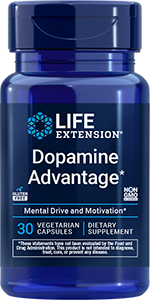
L-Tyrosine Benefits: Uses & Supplement Guide
Published: April 2022
Here’s a riddle for you: what's an amino acid that is non-essential (but sometimes essential!) and supports both your brain and physical function? The answer is tyrosine, which is often used in thyroid support supplements, as well as being an amino acid of choice among athletes and people seeking a cognitive edge.
So what is tyrosine, and will it benefit you...or should you skip on this supplement? And are there side effects? Let's dive in.
What is tyrosine?
Tyrosine is an amino acid, a building block for other proteins and enzymes that the body makes. It is considered a “non-essential” amino acid for humans because the body is able to make it.
Much like the other non-essential amino acids such as glutamine and arginine, we ingest high amounts of tyrosine when we eat both animal and plant sources of protein like beans, nuts, seeds, fish, eggs, and dairy. The average consumer doesn’t have to worry about not having enough tyrosine in our diets. But tyrosine supplements may be beneficial in specific circumstances.
Is L-tyrosine good for you? 5 health benefits

Whether you’re getting tyrosine from food or from a supplement, research suggests this amino acid may offer a wide array of benefits for your body and mind, particularly when you're in stressful situations.
- Exercise performance: Stuck having to do your workout in the midday heat? When L-tyrosine was taken one hour before exercise, healthy volunteers were able to cycle 16% longer before reaching exhaustion in hot and humid conditions. Additionally, their body temperature, heart rate, and perceived exhaustion were not higher despite having exercised longer. Taurine may be a good amino acid to partner L-tyrosine with if you are looking to support physical performance.
- Improve cognitive performance after lack of sleep: L-tyrosine has been shown to help fight the impact of sleep loss on tasks requiring vigilance and mental and physical coordination the next day.
- Deep thinking: Looking to boost your creativity? Tyrosine has been shown to enhance performance on tasks considered to require deeper thinking, cognitive flexibility and creative problem solving in people that took a single 2 gram dose of L-tyrosine.
- Staying sharp in the wintertime: Need to function, physically and mentally, in chilly weather? High doses of L-tyrosine taken before extended exposure to frigid temperatures supported older adults’ ability to maintain their body’s core temperature. In another experiment, taking L-tyrosine before exposure to a 50-degree Fahrenheit bath for 90 minutes improved memory-related performance and speed of performing cognitive tasks.
- Working memory and mood: Multiple different clinical trials suggest tyrosine supplements may help promote aspects of working memory and mood, likely through its impact on the neurotransmitter dopamine.
L-tyrosine supplements: Mind and mood benefits

You may have noticed that tyrosine is linked to several brain health benefits. That’s because in the body, L-tyrosine is a precursor molecule for the synthesis of thyroid hormones and the neurotransmitters dopamine, norepinephrine, and epinephrine. In addition to being important brain chemicals that play a role in memory and mood, neurotransmitters impact other aspects of function systemically.
- Dopamine is the neurotransmitter involved with cognition, creativity, motivation, and feeling good.
- Epinephrine is also known as adrenaline, the substance that is released from your adrenal glands and surges in response to excitement (ever heard of an “adrenaline junkie”?).
- Both norepinephrine and epinephrine are neurotransmitters which are dumped into your bloodstream by the adrenal glands as a part of the “fight-or-flight” response that the body naturally experiences when it encounters something potentially dangerous.
When you take a supplement that contains L-tyrosine, you are ensuring that your body has ample amounts of this amino acid to produce these mood-boosting bioactive compounds, but it isn’t necessary to supplement for most people.
Does tyrosine increase dopamine?
Tyrosine has been shown to increase levels of dopamine (as well as norepinephrine and epinephrine) for about 30 minutes when taken orally at a high dose on an empty stomach.
Subjects in this study did not have noticeable physical or psychological effects of taking this high dose of tyrosine. Animal studies also have found tyrosine supplements can increase dopamine release in certain areas of the brain.
How does L-tyrosine make you feel?
L-tyrosine is necessary to make thyroid hormones and neurotransmitters like dopamine, norepinephrine, and epinephrine. However, by simply taking L-tyrosine in you won’t necessarily “feel” a huge boost of energy or euphoria.
Some research suggests that taking tyrosine supplements can improve cognitive function and physical endurance in stressful settings.
What is the difference between L-tyrosine and tyrosine?
In the human body, tyrosine is mainly found as the “L” form – L-tyrosine. There is another form of tyrosine known as the “D-” form (“D” meaning dextro, or right-handed in Latin). The D-form of tyrosine has been shown to have anti-nutritive effects in mammals. Thus, dietary supplements contain L-tyrosine, which may simply be referred to as tyrosine.
Who should take L-tyrosine?
L-tyrosine is something our bodies need to carry on day-to-day activities. However, it is not necessary to take in tyrosine from food or supplements because the body makes it from the precursor phenylalanine. Both of these amino acids are usually obtained in adequate amounts in a healthy, balanced diet.
If you are following a phenylalanine-restricted diet, speak with your healthcare provider to determine if supplemental L-tyrosine should be taken, and at what dosage.
Explore Our Best Active Lifestyle & Fitness Supplements
Can I take L-tyrosine every day? Dosage & side effects

Inevitably, if you eat protein-containing food, you will be taking in tyrosine every day. (This goes for vegetarians, too.)
Above the normal dietary intake, tyrosine has been safely used in clinical studies at a dose of 150 mg/kg daily for two months. For a 70 kg individual (roughly 150 pounds) this equates to more than 10 grams a day.
At very high doses there may be minor side effects like nausea, headaches, or fatigue which can be mitigated by a lower dose. Generally, in healthy individuals, L-tyrosine supplements are well tolerated without many reported side effects. Benefits to cognitive function have been seen with a dose as low as 2 grams, so this is a good place to start.
Best time to take L-tyrosine supplements
Take tyrosine in the morning. Tyrosine may have a positive impact on cognitive function and exercise endurance, so, it makes sense to take tyrosine earlier in the day prior to these types of activities.
Additionally, thyroid hormone and epinephrine are both associated with an increased sense of energy, and tyrosine is the base amino acid from which these compounds are made. At least in theory, it’s possible that you could feel an increased sense of energy from L-tyrosine, although there are no clinical studies showing this to be the case.
Should I take L-tyrosine on an empty stomach?
Amino acids like L-tyrosine are typically taken on an empty stomach to support optimum absorption. However, tyrosine appears to be well absorbed from food sources like milk or soy protein. In research studies, tyrosine is often taken away from major meals to optimize absorption.
A general guideline to optimize benefits from dietary supplements is to take them in the same manner (dose, timing, etc.) that clinical studies use.
Disclaimer: The information found here is not medical advice and one should speak with their healthcare provider if undergoing treatment for a medical condition or if pregnant or lactating.
References
- Colzato, Lorenza S. et al. “Food for creativity: tyrosine promotes deep thinking.” Psychological Research, September 2014, https://link.springer.com/article/10.1007/s00426-014-0610-4
- Colzato, Lorenza S. et al. “Working memory reloaded: tyrosine repletes updating in the N-back task.” Front. Behav. Neurosci., December 2013, https://www.frontiersin.org/articles/10.3389/fnbeh.2013.00200/full
- Deijin, J.B. et al. “Tyrosine improves cognitive performance and reduces blood pressure in cadets after one week of a combat training course.” Brain Research Bulletin, January 1999, https://www.sciencedirect.com/science/article/abs/pii/S0361923098001634
- Friedman, Mendel et al. “Nutritional and medicinal aspects of D-amino acids.” Amino Acids, April 2011, https://link.springer.com/article/10.1007/s00726-011-0915-1
- Lang, James A. “Oral L-Tyrosine Supplementation Improves Core Temperature Maintenance in Older Adults.” Med Sci Sports Exerc., April 2020, https://pubmed.ncbi.nlm.nih.gov/31609301/
- Mahoney, Caroline R. et al. “Tyrosine supplementation mitigates working memory decrements during cold exposure.” Physiology & Behavior, November 2007, https://www.sciencedirect.com/science/article/abs/pii/S0031938407001722
- Mouret, J et al. “L-tyrosine cures, immediate and long term, dopamine-dependent depressions. Clinical and polygraphic studies.” C R Acad Sci III., 1988, https://pubmed.ncbi.nlm.nih.gov/3126995/
- Neri, D F et al. “The effects of tyrosine on cognitive performance during extended wakefulness.” Aviat Space Environ Med., April 1995, https://pubmed.ncbi.nlm.nih.gov/7794222/
- Rasmussen, D D et al. “Effects of tyrosine and tryptophan ingestion on plasma catecholamine and 3,4—dihydroxyphenylacetic acid concentrations.” J Clin Endocrinol Metab., October 1983, https://pubmed.ncbi.nlm.nih.gov/6885965/
- Reimherr, F W et al. “An open trial of L-tyrosine in the treatment of attention deficit disorder, residual type.” Am J Psychiatry, August 1987, https://medlineplus.gov/genetics/condition/phenylketonuria/#causes
- Tumilty, Les et al. “Oral tyrosine supplementation improves exercise capacity in the heat.” European Journal of Applied Physiology, March 2011, https://link.springer.com/article/10.1007/s00421-011-1921-4
- “Amino acids.” MedlinePlus, https://medlineplus.gov/ency/article/002222.htm
- “Understanding the stress response.” Harvard Health Publishing, July 2020, https://www.health.harvard.edu/staying-healthy/understanding-the-stress-response
Always be in the know!
Access the latest deals, wellness news, expert health tips & more!






